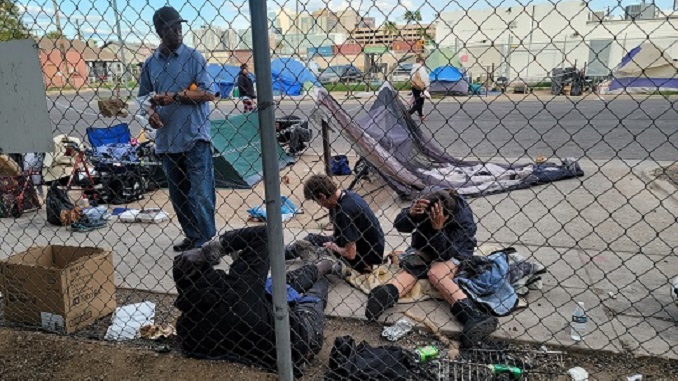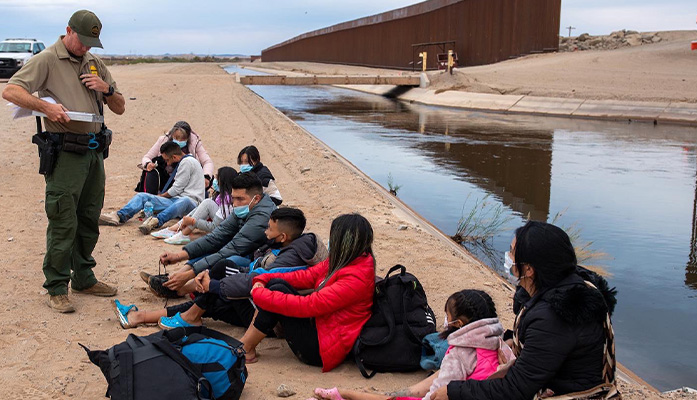
by Corinne Murdock | May 12, 2023 | Education, News
By Corinne Murdock |
Microsoft founder Bill Gates will deliver the keynote speech for this year’s Northern Arizona University (NAU) graduation.
Gates will deliver the keynote address on Saturday during NAU’s 3 pm ceremony for the College of Engineering, Informatics, and Applied Sciences as well as the College of the Environment, Forestry, and Natural Science. NAU will also award Gates with an honorary doctorate.
NAU President José Luis Cruz Rivera said in a press release that Gates was a thought leader that exemplified NAU values.
“It is our privilege to recognize Bill Gates for his pioneering work in science and technology and his long standing thought leadership and philanthropic commitment to creating a world where every person has the opportunity to live a healthy life and live up to their full potential,” said Cruz Rivera.
Gates has advanced and pioneered on several progressive initiatives in science and technology. Most recently, Gates shared with ABC News that he would like the country to rely mainly on nuclear energy in the future to achieve energy independence. Gates also believed that artificial intelligence (AI) should be advanced most for use in health and education.
In recent decades, Gates has also bankrolled efforts to normalize the consumption of bugs or lab-grown meats as an alternative to meat.
Last year, Politico revealed that Gates had helped orchestrate the global responses to the COVID-19 pandemic. Gates’ philanthropy — the Bill & Melinda Gates Foundation, one of the largest in the world — identified vaccine developers and invested in each step of the vaccine development process. His organization also played a role in a global distribution plan for the shots.
In his statement, Cruz Rivera also expressed gratitude that the Bill & Melinda Gates Foundation provided significant financial support to the university.
“As NAU advances its mission to deliver equitable postsecondary value, we are honored to have the support of the Bill & Melinda Gates Foundation as we seek to ensure that the talent and aspirations of people in Arizona and beyond are met with the opportunity to realize economic mobility and social impact—shaping a brighter future for themselves and the communities they represent,” said Cruz Rivera.
Gates’ organization donated just over $500,000 to NAU last October for expanding equity.
On Tuesday, Gates wrote in his blog that he agreed to give a commencement speech at NAU because he believed NAU was “redefining the value of a college degree.” Gates dismissed the traditional notion that the more prestigious and exclusive schools were, the more valuable the degree. Gates said that accessibility, affordability, and economic mobility were better metrics to determine the value of a college’s degree, and declared that NAU was an “emerging leader” by that standard.
NAU had a 57 percent six-year graduation rate as of the latest Arizona Board of Regents data from 2021. Last summer, NAU didn’t rank within the top 100 of the nation’s best universities. They ranked 288.
Gates commended NAU’s achievements in diversity, equity, and inclusion: he praised the fact that nearly half of all NAU’s 30,000 students were “people of color,” mainly Hispanic or Native American, as well as the fact that many were first-generation college students or from low-income families.
Gates commended NAU’s equity-based financial aid structure favoring Native Americans from Arizona tribes over other races.
Corinne Murdock is a reporter for AZ Free News. Follow her latest on Twitter, or email tips to corinne@azfreenews.com.

by Corinne Murdock | May 11, 2023 | News
By Corinne Murdock |
The city of Phoenix began cleaning up the mass homeless encampment known as The Zone this week, after attempts to resist a court injunction to do so. Local residents and business owners have endured the burgeoning public health and safety hazards of the area for about three years.
The cleanups began on Wednesday. City officials reportedly won’t allow the homeless to return to the area if they don’t find shelter. About 900 homeless camped out in The Zone.
The extent of the waste from the homeless encampments was so great that city workers resorted to using forklifts.
The city also re-released a plan to address homelessness on Wednesday morning, largely centered on doubling down on efforts to place homeless individuals with relevant treatment programs. The plan was published originally late last month.
The city’s plan includes creating 800 more shelter beds by the end of 2024, and parsing out the $140 million committed beginning in July 2021. The city also proposed potentially leasing hotel rooms, using vacant plots, and creating a campsite of sorts.
The city noted in its plan that the five cleanups initiated since December resulted in placement of 67 percent of the several hundred offered services.
The CEO of the shelter at the heart of the Zone, Amy Shwabenlender with Human Services Campus, told AZ Family that the cleanup was necessary, but not a “long-term solution.”
The city of Phoenix unsuccessfully fought the Maricopa County Superior Court order to clean up the Zone earlier this month. Within the same day of the city’s petition to extend the July deadline for cleanup, Maricopa County Superior Court denied the petition. Judge Scott Blaney rejected the city’s claim in its petition that it had already undertaken significant action.
“The Court interprets this argument as meaning the injunction is unnecessary because the City is already taking steps to abate the horrible conditions in the Zone,” wrote Blaney. “But the Court issued the Preliminary Injunction based, in part, upon the City’s past failure to address the issues in The Zone, as well as the City’s apparent lack of intent to do so until faced with possible judicial intervention.”
Blaney ordered the city to commence its cleanup of The Zone in late March. Blaney declared that the city had done nothing to improve the public nuisance caused by the mass homeless encampment burdening the downtown area. Rather, Blaney said that the city’s actions purporting to address the homeless crisis had served only to grow its bureaucracy and ineffective programs initiated by themselves and nonprofits over the years.
“With few exceptions, the action items about which city representatives testified centered around the creation of more bureaucracy, additional staff positions, and obtaining additional funding for programs to vaguely address homelessness in general,” stated Blaney. “The Court received very little evidence — if any — that the City intends to take immediate, meaningful action to protect its constituent business owners, their employees, and residents from the lawlessness and chaos in the Zone.”
Corinne Murdock is a reporter for AZ Free News. Follow her latest on Twitter, or email tips to corinne@azfreenews.com.

by Daniel Stefanski | May 10, 2023 | News
By Daniel Stefanski |
Some Arizona special interest groups and legislative Democrats were furious with the state’s budget compromise this week, and Governor Katie Hobbs may be feeling their wrath for months to come.
As details of the finalized budget negotiations were unveiled, outrage ensued over the protection of Arizona’s historic ESA program, which Hobbs and most other Democrats have vowed to dismantle or cap while in office. Senate President Warren Petersen, House Speaker Ben Toma, and other legislative Republicans had accomplished their primary mission to defend and sustain the ESA program for existing and new families, despite the Grand Canyon State’s divided government.
Before the votes in both chambers, the two Democrat leaders for the House and Senate issued a statement, calling on negotiations to continue, in large part, due to the uncapped and very-much-so protected ESA program.
A coalition (consisting of the Arizona High School Democrats, Arizona State University Young Democrats, Keep Arizona Blue Student Coalition, Maricopa County Young Demcorats, Northern Arizona University Young Democrats, University of Arizona Young Democrats, and the Young Democrats of Arizona) wrote a letter to the state’s chief executive, urging her “to go back to the drawing board and reject any budget that does not include a cap on ESA vouchers.” The student-led letter asserted that “continuing this reckless expansion would have a detrimental effect on public education in our state.”
Save Our Schools Arizona Director Beth Lewis wrote an op-ed for a local publication, stating, “For Hobbs and legislative Democrats, this budget is a must-win game that will decide the future of public education in our state. Will they rise to the challenge and play full court press, or will they fail to deliver on their campaign promises to public education? We’ll know soon.”
The organization also reminded Hobbs of her recent call (on March 22) to roll back the ESA program in the latest budget, tweeting, “We couldn’t agree more, Governor Hobbs! AZ’s budget **must** roll back ESA vouchers, or the state cannot fulfill its constitutional responsibility to fund our public schools.”
The lobbying from Save Our Schools and others turned to desperation and politicized grief as both the House and the Senate passed the budget bills over Tuesday-Wednesday, ensuring that Arizona’s ESA program will continue to benefit tens of thousands of families attempting to control their children’s educational pursuits and objectives. After the state senate approved of the K-12 Education budget bill, Save Our Schools AZ tweeted, “Under cover of night, the Senate votes 25-5 to pass the K12 portion of the budget with zero progress towards a cap on unfettered ESA vouchers.”
And after the Arizona House gave a green light to the same K-12 budget bill, Save Our Schools AZ responded, “BREAKING: AZ House passes the K-12 budget 43-16, betraying AZ public schools by failing to cap the universal ESA vouchers that threaten to bankrupt AZ. Thank you to the 16 #PublicSchoolProud lawmakers who took a principled stand by voting NO. Fighting for what’s right matters.”
After the dust settled on the votes, Arizona Republic columnist Laurie Roberts opined, “Hobbs, in her State of the State speech, called for a repeal of the universal voucher program but the more likely prospect was a spending cap, to ensure it doesn’t suck the lifeblood out of the public schools that the vast majority of Arizona children attend. Instead, she negotiated a budget that protects the Republicans’ signature universal voucher program. Instead of standing tough and insisting on a budget that could draw legitimate bipartisan support, she teamed up with Republicans and steamrolled her own stunned allies.”
On Wednesday, the Arizona House Majority Communications sent out a press release, announcing the creation of an Ad Hoc Committee to Examine ESA Administration – due to “discussions between the House Speaker and the Minority Leader.” The purpose of the new committee is “to provide clarity and ensure that the governance and administration of ESAs is appropriately designed to manage a growing and complex program.”
Democrat Senator Catherine Miranda seemed to see it as an opportunity to quell her fellow Democrats’ complaints and applauded the news of the new committee, saying, “It was our last piece of hope to get SOMETHING to at least have ESA CAP talks. This will allow that path.”
Daniel Stefanski is a reporter for AZ Free News. You can send him news tips using this link.

by Daniel Stefanski | May 10, 2023 | News
By Daniel Stefanski |
Amid a growing dispute with Governor Katie Hobbs and the Arizona Legislature over water issues, Democrat Attorney General Kris Mayes is adding another grievance to her tab: the Arizona Fiscal Year 2024 budget.
On Saturday, Attorney General Mayes transmitted a letter to Governor Hobbs and the Arizona Legislature, expressing her “alarm concerning what is currently under consideration for the Arizona Fiscal Year 2024 budget.” According to Mayes’ knowledge of the state of budget negotiations at the time, “most state agencies, including executive offices established by the Constitution such as the Arizona Attorney General’s Office, would not receive any new ongoing monies from the state’s General Fund in FY24.”
In her letter, Mayes noted that her office had requested “a 15 percent pay increase equal to $3,864,700 in ongoing General Fund dollars for the DCS Attorney General Special Line Item to protect Arizona’s children;” an appropriation of “$3,014,500 from the General Fund for 18.5 full-time employees in the Criminal Division that are currently funded from a temporary appropriation from our Consumer Protection Revolving Fund (CPRF);” $1,750,000 to backfill that (National Mortgage) Settlement funding with a CPRF appropriation (for 13 employees in the Consumer Protection Section of our Civil Litigation Division);” and another “$2,150,400 from the General Fund to replace this funding (from the Anti-Racketeering Revolving Fund) we will lose (because of recent statutory changes).”
General Mayes explained her reasoning for this letter in a statement issued Monday, writing, “Over the weekend, I expressed my alarm over a budget proposal that ignores vital needs of Arizonans – including much-needed funding for our office to continue to crack down on crime and fraud. Today, we see a budget proposal moving forward that appears to be politically expedient for a few, but wholly inadequate for the majority of people in our state. As I said, I am opposed to any statewide budget proposal that does not adequately fund Arizona’s ability to fight the fentanyl crisis and the drug cartels, protect Arizona’s children and combat elder abuse and consumer fraud.”
The State’s Chief Law Enforcement Officer also challenged the governor and members of the Legislature to come up with the requested funds, saying, “The Legislature and Governor need to go back to work and produce a budget that is in the best interest of all Arizonans. We need a budget that funds essential state services that protect the well-being and safety of all Arizonans. I will continue to fight, especially for our most vulnerable residents, as well as the dedicated, hard-working public servants in the Attorney General’s Office.”
Mayes, however, saved her most contentious declaration for the end of her letter, mentioning the “talk of the Legislature sweeping the authority of the Attorney General to direct funds received through consent judgments against several pharmaceutical companies for their roles in the opioid crisis.” She warned, “Sweeping this authority from the Attorney General would be a breach of the consent judgments, and as Attorney General I will not stand by and allow this to happen. I fully intend to consult with the Legislature as the judgments dictate. Any proposal that contradicts this provision by having the Legislature instead direct how the state funds will be used is not acceptable, and I am prepared to go to court to ensure that the State is able to obtain and properly direct those funds for opioid treatment, prevention and education if warranted.”
“Attorney General Mayes should learn the facts first, and accurately convey those facts in committee hearings, before making demands and threats to sue the Legislature and the Governor over the budget,” tweeted Livingston with a copy of his letter to her in which he points out that the Legislature does in fact have a say in how the funds are used.
Daniel Stefanski is a reporter for AZ Free News. You can send him news tips using this link.

by Daniel Stefanski | May 10, 2023 | News
By Daniel Stefanski |
The Biden Administration is attempting to mitigate unfavorable headlines at the southern border once again.
Last week, the U.S. Department of Defense (DOD) confirmed a report that more troops were headed to the U.S.-Mexico border. A statement attributed to Pentagon Press Secretary Brig. Gen. Pat Ryder read, “At the request of the Department of Homeland Security, Secretary Austin approved a temporary Department of Defense (DoD) increase of an additional 1,500 military personnel to supplement U.S. Customs and Border Protection (CBP) efforts on the U.S. Southwest Border.”
The news from the Pentagon came just days before a COVID-era border policy, Title 42, is scheduled to end. Title 42 was an action “derived under U.S. Code Title 42, Section 265” …to suspend “entries and imports from designated places to prevent spread of communicable diseases.” According to a memorandum from then-U.S. Border Patrol Chief Rodney S. Scott, “while operating under this authority, USBP will use Title 42 authority to immediately expel any individual encountered attempting to enter the United States in violation of travel restrictions.”
Experts and border officials have long predicted disastrous consequences for the end of Title 42, and recent numbers have confirmed those warnings. On May 1, U.S. Border Patrol Chief Raul Ortiz tweeted the news that there were 22,220 apprehensions at the southern border in the past 72 hours.
Brig. Gen. Ryder’s announcement gave insight into the assigned duties of the additional troops, stating, “For 90 days, these 1,500 military personnel will fill critical capability gaps, such as ground-based detection and monitoring, data entry, and warehouse support, until CBP can address these needs through contracted support. Military personnel will not directly participate in law enforcement activities. This deployment to the border is consistent with other forms of military support to DHS over many years.”
Texas Governor Greg Abbott had an entirely different perspective on the DOD’s move, tweeting, “Biden says he will deploy 1,500 troops to the border – primarily to do paperwork. And only for 90 days. This does nothing to stop illegal immigration. I deployed up to 10,000 Texas National Guard to the border to fill the gaps created by Biden’s reckless open border policies.”
Over the past few weeks, Arizona Governor Katie Hobbs does not appear to have proactively issued statements about the end of Title 42, the influx of troops to the border, or the expected increase in illegal immigration. Her last Twitter communication about border security may have been on April 24 when she touted her meeting with Sonora Governor Alfonso Durazo, writing,
“I had a productive conversation with Governor Alfonso Durazo on expanding partnerships in trade, commerce, and infrastructure, and opening lines of communication between our governments as we come closer to the expiration of Title 42. We will use all the tools and resources available to manage the effects of lifting Title 42, including our partnerships in Sonora that support the Sonoran mega-region and create lasting and meaningful cross-border collaboration.”
Daniel Stefanski is a reporter for AZ Free News. You can send him news tips using this link.

by Corinne Murdock | May 10, 2023 | News
By Corinne Murdock |
Maricopa County began to give $5 million to serve refugees, starting May 1.
The Maricopa County Board of Supervisors (BOS) approved the $5 million appropriated from American Rescue Plan Act (ARPA) funding to go to nonprofits serving refugees.
The nonprofits serve as part of the Maricopa County Relocation Assistance Program, a welfare program to bolster refugee and refugee family economic and social self-sufficiency.
In a press release, Supervisor Steve Gallardo said that the county was fortunate enough to subsidize this welfare program for refugees.
“Maricopa County is fortunate to have many nonprofits that help refugees from other countries find housing, medical care, and cross language barriers so they can integrate and become an asset,” state Gallardo.
The greatest bulk of the funding went to Chicanos Por La Causa (CPLC) with nearly $1.88 million to serve 40 families. That metes out to nearly $47,000 per family. Their program provides the widest array of services: outreach, intake, transitional housing, legal services, and stabilization support.
As AZ Free News has reported previously, CPLC’s subsidiary is facing federal investigation for pandemic loan fraud. CPLC’s President and CEO, David Adame, served on Gov. Katie Hobbs’ transition team.
It’s interesting that Gallardo decided to speak on this latest round of refugee welfare, since he also served on Hobbs’ transition team with Adame and, later, was Hobbs’ pick for Democratic Party Chair.
Of note, the federal webpage outlining the investigation into CPLC’s subsidiary, Prestamos, for pandemic loan fraud disappeared in late February. Archives of the report were available through February 24, but disappeared by February 27.
Also earlier this year, several CPLC leaders were identified as part of the liberal think tank that helped provide the cover-up for Hunter Biden’s laptop.
The Area Agency on Aging will receive over $125,400 to assist 100 elder refugees with pre-literacy and citizenship classes, as well as financial assistance for citizen application fees.
Friendly House received nearly $345,000 to provide adult education, emergency report, and immigration services to 150 refugees.
The International Rescue Committee received over $1.6 million. Of that funding, over $675,500 will provide case management services to 100 refugees, as well as training those community providers in “culturally appropriate techniques” to provide “culturally appropriate services” to crime victims. The remainder, over $957,400, will give legal services for refugees.
Lutheran Social Services will receive $600,000 to provide case management, medical services, and other support to “the most vulnerable refugees.” The press release named families, single parents, and women under this category.
Finally, the Somali American United Council of America will receive $312,000 to give refugees job placement services and “women’s empowerment.” The funding will also support nutrition, health, citizenship, digital literacy, and cultural adaptation classes.
Corinne Murdock is a reporter for AZ Free News. Follow her latest on Twitter, or email tips to corinne@azfreenews.com.






